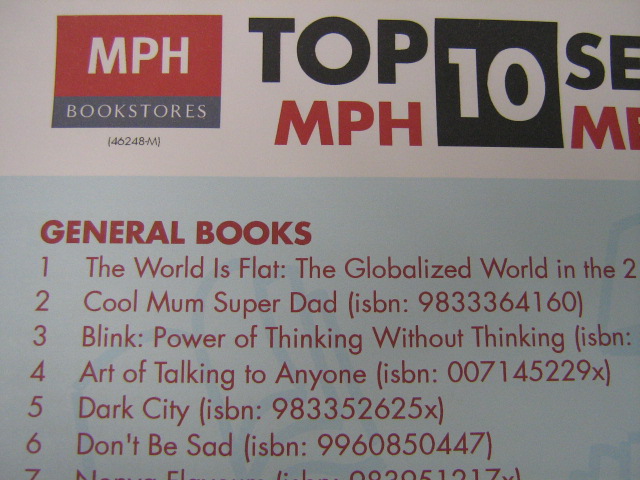Myanmar experience
http://thestar.com.my/lifestyle/story.asp?file=/2008/7/19/lifeliving/1457412&sec=lifeliving
Count your blessings
By EUDORA LYNN
Cyclone-ravaged Myanmar changed our writer’s perception of life. She compares and contrasts life in Myanmar with Malaysia.
I take my life for granted. I do, I really do, and this is not meant to be another mouthpiece about how great it is to be Malaysian.
But we have been bitching recently about how hard our lives are without joyrides from Kuala Lumpur to Kajang in our 3,000cc four-wheel drives and European holidays that I thought I’d do a reality check.
It struck home when I visited Myanmar. Life in pre-cyclone Myanmar was tough by Malaysian standards; life post-cyclone is even harder. In Yangon, collapsed roofs and grates of government buildings remained unrepaired. Fences were smashed by trees. Pavements had holes as big as rain puddles.
“When are they going to be repaired?” I asked a Myanmarese friend.
“When the government has money,” she says, “which is not likely to be anytime soon.”
On electricity
I never realised how much we take electricity for granted. At home, whenever there is an outage, we’re on our phones immediately to Tenaga Nasional, screaming murder.
While visiting a shop in Yangon, the overhead fluorescent light suddenly dimmed. It sputtered, went dark completely, then came on again.
“Electrical outage?” I said knowingly.
“It’s our generator,” the shop owner informed me. “It’s been giving problems of late.”
“Why do you have generators?” I asked.
“Because in Myanmar, electricity is erratic. Not all areas have electricity and most of us have to pay for our own generators. There’s enough electricity to go round during the monsoon when the rivers swell and there is plenty of water to turn the hydroelectric turbines, but during the dry season, there isn’t enough power to go round. Even water is erratic. During the cyclone, there was no electricity and water for days. We had to depend on well water.”
“When looking for an apartment or house,” my friend chimed in, “we always try to seek a location where there’s water and electricity. You have to pay more for those apartments.”
The good thing about those apartments is that they are not costly by Malaysian standards. An average apartment in a good area costs around US$20,000-US$40,000 (RM64,600-RM129,200). But most people don’t earn that kind of money.
The government sector doles out a measly pay, as little as under US$3 (RM10) a month, although they don’t tax you. The private sector pays better, though you’d have to pay significant taxes.
There are no bank loans in Myanmar. Everything is paid by cash. To pay for an apartment, most sellers prefer to see money on the table — take it or leave it.
The kyat
The highest denomination of Myanmar currency is 1,000 Kyat, roughly equivalent to US$ 0.85 (RM3), though the rate fluctuates daily.
To get around the city, you’d have to have plenty of banknotes. The price of meals is roughly the equivalent of what you’d get in Malaysia — a bowl of curry noodles costs around US$1.20 (RM4), depending on its size. But if you contrast that to what the average Myanmar citizen gets, it’s a wonder anyone gets to eat out.
But most Myanmar people don’t go out much at all.
“It’s a habit from our curfew days,” said my friend. “You go to work and hurry home before it gets dark.”
Though homeless, this Myanmarese boy manages a smile. - AP
No expense, however, is spared for the temples — the ones I’ve seen in Yangon and Mandalay have Buddha statues and pagodas adorned with gold leaf.
You can buy four tiny wafer-thin ones for 1,500 kyat. Devotees stick these gold leaves onto statues. Collection boxes are rife everywhere, especially temples — Myanmar is a country of charity.
“And no wonder,” remarked an acquaintance, “if our government is not going to help us, who can we depend on but each other?”
But do not begrudge the temples and monks their relative wealth. The monks are everywhere, helping the needy. Foreigners are not allowed into the Irrawady Delta, the hardest cyclone-hit, but the Myanmarese showed me video clips. The monks are there, tending to the sick, swathing bandages over leg ulcers as big as saucers.
When my Myanmar friends asked me what I thought of Yangon and Mandalay, I told them truthfully both were beautiful cities, and the palaces and pagodas were splendid in the clean, relatively haze-free air. In fact, Yangon reminded me a lot of Penang and Ipoh.
The streets are broad, the houses colonial; there are plenty of umbrella trees providing much-needed shade. But that’s where similarities end. In Myanmar, the cars are sparser and there are few traffic jams. The roads and pavements are bumpy and broken; I have to watch where I tread every step of the way.
“There is no maintenance whatsoever,” my friend declared. “There simply isn’t enough money.”
Nor is a car easy to own. A normal sedan is costlier here than in Malaysia.
“If you want a Honda Accord, you’ll have to fork out US$70,000 (RM226,000) for it. On top of that, you have to pay US$80,000 (RM258,000) for a new car licence.”
That is why most citizens drive ancient, sputtering cars.
The concept of car maintenance is virtually unknown.
“When your car breaks down, then only will you repair it,” said my friend.
Survival
There are no motorcycles in Yangon. A top Junta general’s car got hit by a motorbike, the story goes, and he outlawed motorbikes in Yangon from then on. Public transport is extremely bad — buses are frequently late, dusty and dirty.
Tuk-tuks ply the road, ferrying passengers in the dust; sometimes as many as 20 people cling on to an open tuk-tuk meant for 10.
How is it, if one earns as little as US$3 a month, that one survives at all?
“Government servants take on extra jobs after hours,” my friend said. “It’s common to work two or even three jobs just to make enough to feed your family.”
Corruption in the government is rife; most do it just to survive. There is not enough government money to go around because of the economic sanctions placed on the Junta by lofty countries.
When there are sanctions, it is the average citizen who suffers.
I commented on how nice and polite most Myanmar workers were.
“They have to be,” my friend said. “They’re afraid of being sent back to Myanmar, so they’re always on their best behaviour and try to make themselves as ‘untroublesome’ as possible.”
In the end, the average Myanmar citizen still survives.
“We do not need much to be happy,” someone told me. “We are content with what we have and do not ask for much. And we are still happier than what most people in some so-called richer countries are.”



12 comments:
“We do not need much to be happy,” someone told me. “We are content with what we have and do not ask for much. And we are still happier than what most people in some so-called richer countries are.”
And what a timely reminder as with everything that's happening to our country --- the economy, inflation, politics --- there's much for us to grumble about, too easy almost, that we still have SO MUCH.
Been awhile since we last met, btw. Hope you are well, dear. :)
Kenny, I miss you!!
Anytime a writer begins by saying how much she/he realises she/he has been taking life for granted, how lucky she/he actually is, the writer is actually saying "Damn, I'm lucky I'm not living in such a shitty place."
I think this kind of writing is very condescending and disrespectful.
A real and truly sympathetic look at the lives of those less fortunate would exclude such statements, and would only be concerned with highlighting the problems faced by them and hopefully expediate a solution.
Imagine if you were writing about the disabled, and you started your article by saying how you've been taking your legs for granted. Imagine what kind of reaction that would elicit.
Dear Allan,
If my article in any way has caused certain Malaysians to pause in their daily whinge-ing about their current predicament about the petrol price increase and how difficult their lives are, and the fact they should reflect upon how lucky they are and do all they can to donate to those less fortunate instead of holding back donation money at a time like this - then I have done my job.
I don't see what's wrong by saying you've been taking your legs for granted. It's not condescending; it just tells us the writer has not been counting her blessings enough. Everything's relative. There's always someone better off/cleverer/richer/poorer/more compassionate than us. While people's lives in Malaysia are not so bad, there's no reason not to ask the govt to do better and be more accountable in using taxpayers' ringgit.
Xeus, I think your worldview has been broadened by knowing these few Myanmarese and thus you've been enriched.
Thanks Argus. At least I have been to Myanmar no less than twice so far and have gone into their slums and tried to help them though donations, carting in food and stuff and geenrally spending as much as I can there to improve their economy again (my last out of own pocket spend there was RM 2300!)
If these so called condescending articles can get other people to do the same, then mission accomplished!
Hail every single newspaper from Chcaigo tribune to Guardian UK. Whenever they write about Malaysian politics these days, their tone is - gasp - nothing but condescending. (Though I think most of them use the word 'circus'.)
Dear All,
I googled and i found you and your friends.
I am looking for a good writer.
Type: Comic
( Will not be sold in Msia)
If anyone is interested, do send the samples of your work to
Emily Cheah
cryssal@yahoo.com
Maximillan
art.nexus@gmail.com
Regards
EMily
thanks for an eye opener article dear.. and here i am complaining bout the problems i have when i shud be more grateful. =)
I have asked before, and not got a reply but when does/did the submission date close?
I was interested in writing a little ditty.
Yusuf
Dear Yusuf, sorry for being tardy. There will only be a 3rd book if the 2nd is a success. There's no deadline.
Hey there! Come and join us for a BBQ buffet at the beach in Penang this Christmas with watersports activities included!Sign up now! Check out my website at www.runwiththewave.com See you at the beach! THanks!
Post a Comment